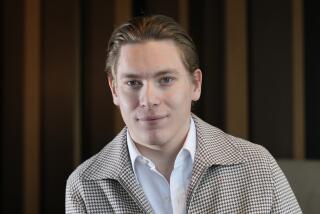2nd-Place Tchaikovsky Prize No Deterrent to Pianistâs Career
Sometimes, almost is good enough. In 1982, British pianist Peter Donohoe--who will perform with the Los Angeles Philharmonic this weekend--came in second at the International Tchaikovsky Competition in Moscow, and the ensuing publicity boosted his career the way no mere victory could.
The catch was, the judges awarded no first prize. For the first time since the quadrennial international competition began in 1958, a first prize was not awarded. Donohoe shared the silver medal with Vladimir Ovchinikov, a graduate of the Tchaikovsky Conservatory in Moscow.
The decision was not a popular one, appearing politically motivated even to the local Moscow public. It created a scandal in the international music community.
âThe absence of a first prize was wrong,â Donohoe said in a telephone interview from England last week. âIt was so obviously a political decision.â
At the time, though, Donohoe said, âI did debate with myself whether they (the judges) were right, but I decided they werenât. I think I have shown since that they were wrong.â He noted, however, that his erstwhile rival, Ovchinikov, won the Leeds Competition two months ago.
âI think theyâre going to do the honorable thing in the future,â he said. He sees many changes from the opening of Soviet society in recent years, changes which he has had ample opportunity to observe.
As the audience favorite at the 1982 competition, he was quickly engaged for a concert tour of the Soviet Union, and he has returned almost annually ever since, most recently in April. As a side-effect, Donohoe has acquired a formidable Russian repertory.
âI turned to the Russian repertoire for the competition, and found that I do have an affinity for it,â the 34-year-old pianist said.
His vehicle with the Philharmonic, in concerts at the Music Center Friday through Sunday, is Stravinskyâs Concerto for Piano and Winds. The other pieces, on an intriguing agenda directed by compatriot Simon Rattle, are Stravinskyâs Symphony in Three Movements and the three âLeonoreâ Overtures by Beethoven.
Stravinsky wrote the Concerto for his own use, and Donohoe hears imposing stylistic challenges in it. âI would defy the great majority of pianists I know to play it rhythmically,â he asserted.
According to Donohoe, the piece requires very special technique and exceptional rhythmicality. He attributes some of his own ease with it to âquick wristsâ developed from his experience as a professional jazz percussionist.
Rattle, principal guest conductor of the Philharmonic and music director of the City of Birmingham Symphony in England, is a colleague with whom Donohoe has frequently worked.
âHeâs a great friend to have in music,â Donohoe said. âIâve learned a lot from him. I learn more from conductors than from other pianists.â
Donohoe himself has begun doing some public conducting, though âI donât push it at all.
âThe experience has been very, very helpful,â he said, noting the importance of a broad knowledge of music literature beyond just the pianistic. âI think a lot of that goes into the pieces you do play.â
The biggest influence in Donohoeâs training was his teacher in Manchester, a Pole who adopted the English name Derrick Wyndham. Donohoe later studied for a year in Paris with Olivier Messiaen and the composerâs wife, Yvonne Loriod.
But when it came to competitions, Donohoe was largely self-motivated. âI knew from a purely practical point of view that without it (a prestigious competition victory), my career had reached a ceiling.
âThereâs no question that as things are, the competition helps,â Donohoe acknowledged. âWhether it should or not is another question.â
As a method of bringing the most deserving musicians to public attention, competitions have shown real flaws. âFundamentally and instinctively, I disagree with it (the competition process),â Donohoe said. âBut what alternative is there?â
The pianistâs extensive experience with contemporary music got him âin the habit of starting absolutely from scratchâ when studying a work. He said of Rachmaninoffâs Third Concerto, a mainstay of his repertory, âI was really quite happy to take the score on its own terms, and thatâs how I play it.
âBeing faithful to the score and not having personality are two different things,â Donohoe added. âYou donât need to impose a personality on the music. Personality is an involuntary thing, not a calculated one.â
He sees a time coming when he might begin to specialize more, but âitâs very important not to specialize when youâre too young.â He plays no Baroque music, nor much Mozart, though he does perform Haydn and Beethoven regularly.
In addition to the Russian and French music with which he has become associated in concert and on record, Donohoe has ardently championed contemporary British composers. âThe biggest problem of contemporary music is the lack of commitment from the star performers,â he said âI try to be different.â
More to Read
The biggest entertainment stories
Get our big stories about Hollywood, film, television, music, arts, culture and more right in your inbox as soon as they publish.
You may occasionally receive promotional content from the Los Angeles Times.










